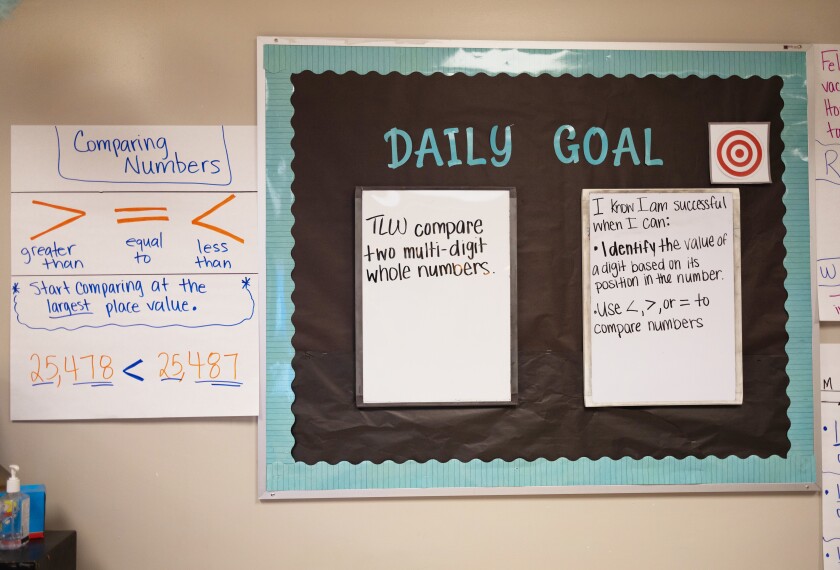Math anxiety affects roughly 25 percent of students, which can prevent them from learning and taking more advanced mathematics courses.
Fear around the subject can include being in a math class, participating in a problem-solving activity, and taking a test. Oftentimes, students do not outgrow their fear of doing math—1 in 4 educators reported discomfort with math, according to an EdWeek Research Center survey.
“Students may think [math] is this innate ability so if I’m not born with this so-called math gene then I won’t ever get it, but we all know that isn’t true,” said Viveka Vaughn, an associate professor of mathematics education at Wayne State University during a recent Education Week webinar. “We know the mathematics and the learning of mathematics just takes practice.”
Two other experts, Kevin Dykema, a math instructional coach at Mattawan Consolidated Schools in Mattawan, Mich. and past president of the National Council of Teachers of Mathematics (NCTM), and Braxton Hall, an instructional coach at Oldham County School in Oldham County, Ky., also shared ways teachers can support students with math anxiety and boost their confidence.
Here are three takeaways from the discussion.
Normalize making mistakes in math
Vaughn has researched math anxiety and math trauma, which is the belief that if a student undergoes one or more negative experiences learning math, it can steer them away from pursuing the subject further. Vaughn said the primary difference is that math trauma often prevents students from pursuing a career in the math field. Usually, these students have had negative experiences where a teacher either embarrassed them or didn’t help them through their difficulty with math.
“That one event prevents them from pursuing math altogether, and so for me, that’s traumatic because of all that untapped talent that we are losing in the STEM field,” said Vaughn.
Teachers can help students be more comfortable with making mistakes in math by being a role model. When doing problem sets with students, Hall said he purposely makes a mistake to show that it is normal.
“Showing them that even adults, whether it’s a teacher or professional mathematician, we’re going to make mistakes and model how to look through our own problems and move on from them,” said Hall.
Give students autonomy
In preparation for a unit exam, Hall sets up different work stations around the classroom that focus on different parts of the unit. This method allows students to work in small groups on material they feel less confident in without being singled out, said Hall.
“It gives [students] that ownership in their education and where they are in getting ready for that assessment,” said Hall.
While there are different opinions in the math world about timing math tests or activities; Vaughn tells her students to time themselves during homework assignments to see where they might need more work or comprehension.
“Instead of timing everything as high stakes, maybe some low-stakes assessment and activities can be timed to alleviate some of the pressure and anxiety students have,” said Vaughn
Calm nerves before exams
Dykema says it’s important not to wait until an assessment to see if students understand the material.
Educators can do formative assessments and student reflections to gauge which students might need more help. For example, at the end of one class, the teacher might list three big ideas as takeaways and asked students to do a thumbs up or down to signal if they understood each point.
“All that feedback that the teacher was getting, they’re not having to wait until the assessment,” said Dykema. “The more that we can do within our own classroom instead of waiting until the assessment, the better off we prepare students for those assessments.
Right before a test, experts in the event agreed that having affirmations around the classroom helps with exam nerves.
Hall worked with a teacher who, throughout the school year and before each class, had students say affirmations. These positive comments would be reiterated before testing, giving students a boost of confidence.
“Students walked into the test much more confident than if we [the teachers] were handing [the test] out and told them to do their best,” said Hall.






